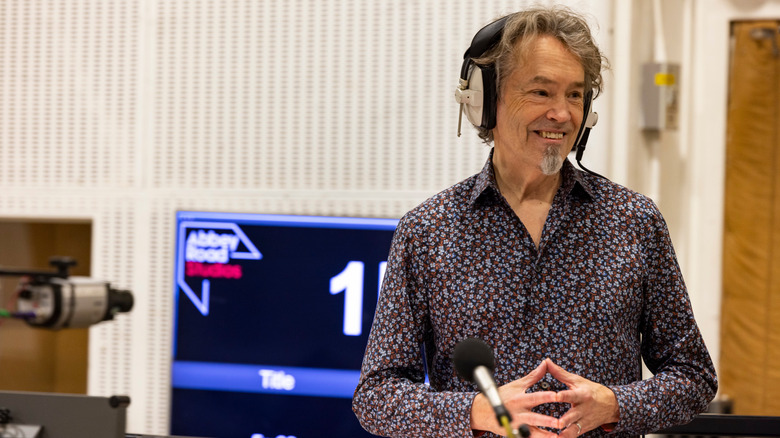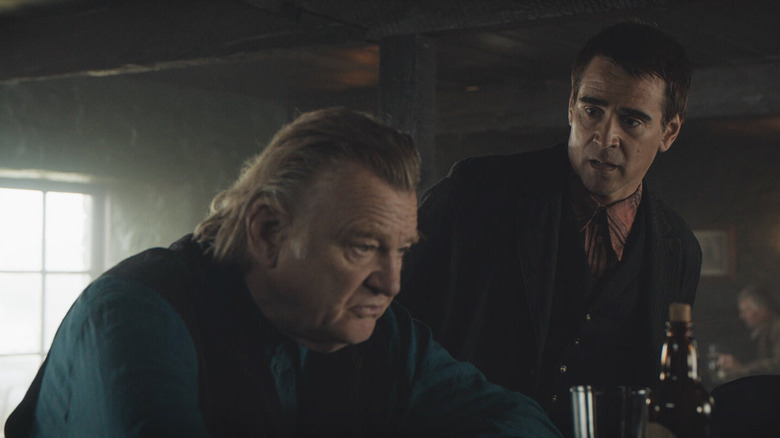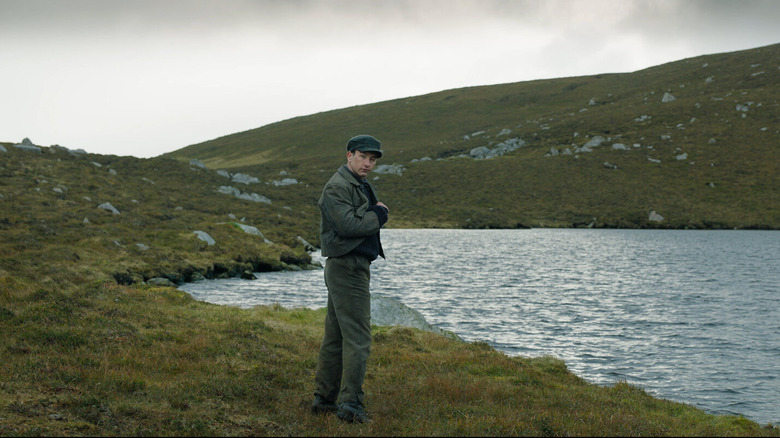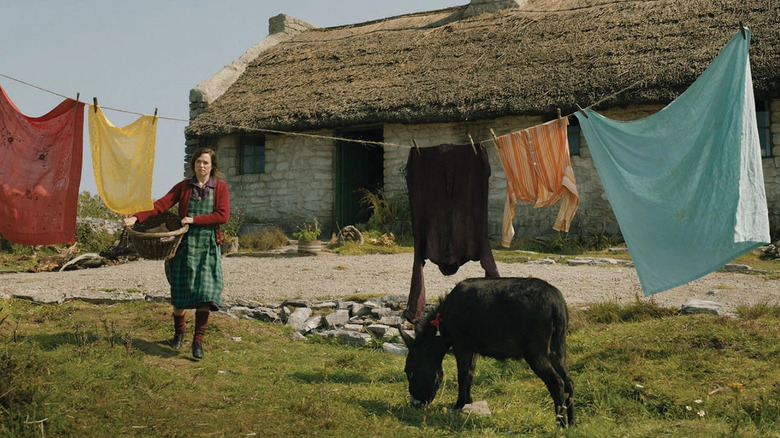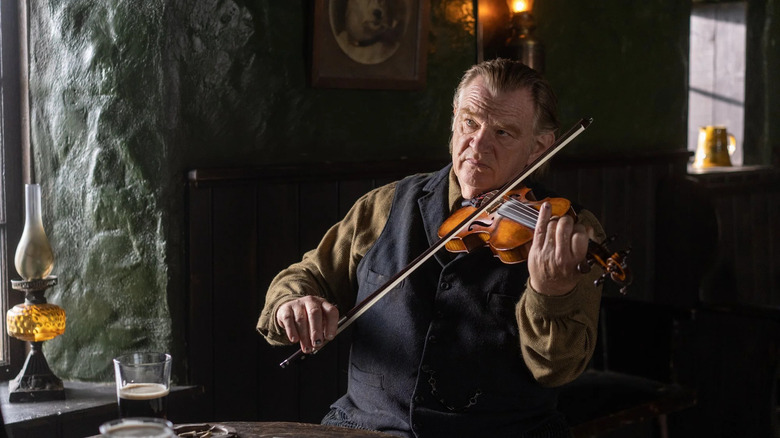The Banshees Of Inisherin Composer Carter Burwell On Writing Contradiction And Simplicity [Exclusive Interview]
Carter Burwell is now nominated for his third Academy Award. The composer's latest collaboration with Martin McDonagh, "The Banshees of Inisherin," captures both familiar and almost indescribable feelings. There is loneliness in the whispers of the strings, as well as instrumentals that help make viewers question what it all means in McDonagh's film.
Burwell is the composer behind a long list of modern classics. He's the Coen Brothers' go-to composer and scored "Barton Fink," "Fargo," and "Miller's Crossing." He regularly collaborates with filmmakers Todd Haynes, Spike Jonze, and Brian Helgeland. Simply put, he's one of the best. Recently, we interviewed Burwell to discuss his work in "The Banshees of Inisherin."
Note: This interview has been lightly edited for clarity and brevity.
'We all are trying to let the words be their own melody'
You don't compose the more dialogue-heavy scenes. Did you and Martin talk about that, or is that just your personal taste?
We didn't talk about it, so I think in a way, it is taste. It's the same when I work with the Coens. In fact, most of the people I work with regularly, my taste is not to have music churning away under dialogue. What's the point? If the dialogue's well-written and the actors are acting well, why am I there? I say this knowing that probably 90% of films have music basically from end to end, even when people are talking or whatever.
My taste is to not have music while under dialogue. It's funny we don't talk about it, no, but without talking about it, we're all in complete agreement on that one. It might be because Martin's a writer-director and the Coens are writer-directors. I think they love their words, I love their words, and we all are trying to let the words be their own melody when someone's speaking.
The opening shot of the movie descends from the clouds. The source music Martin used for that shot, how did it help set a tone for you?
Well, the Bulgarian piece of music, I had a little problem with that part. I actually sang it once at a friend's wedding. When Martin said he wanted to put it at the beginning of the film, my reaction was, "Well, are people going to think they're in Bulgaria?" Of course, that doesn't seem to be any problem. Most people probably imagine it's Irish that they're singing, I don't know, but it's hard for me to distance myself from the song because I know it so well.
The piece that actually did have a real impact on me was the Indonesian piece, because the instrumentation is so different than in everything else. It's gamelan gongs, wood drums, things like that. I think it did have an impact on me partly because it did contribute to my feeling of, I wanted to use bells and things in the score. And that piece made me think, "Yeah, I think that's going to work well. I'm going to use these bells and celesta basically for Colin Farrell's character and it will work with the gamelan piece."
At the same time, I was concerned that those strange sounds — strange to Western ears — would maybe pop you out of the film when you got to the middle of the film. That's where Martin wanted to put the Indonesian piece. So I started working Indonesian gamelan sounds into my score, thinking, "That'll ease us into that. We'll be used to hearing those sounds and those strange harmonics." So it had an impact on the score, because those gamelan gongs are in right from the beginning, the first time you see Colin walking from his friend's house to the pub or leaving the pub.
In the end when we had written the whole score, we all kind of agreed, "Well, the Indonesian piece, it still doesn't really fit and we also have all these nice themes for the characters and the story, so I'll just write that piece." So we got rid of the Indonesian piece. It doesn't appear anywhere, but it did definitely have an influence on the score in that those sounds still live on, like ghosts of an earlier idea.
Also at the beginning, when Colm tells Pádraic he doesn't want to be friends anymore, did you want a low-key hint of foreboding there?
No, I didn't want it to be foreboding, but I do know that people do hear, for instance, the gamelan sounds down at the bottom of the list of instruments at the lowest frequencies. People hear that and respond that there's something wrong because their harmonics don't match up with the Western instruments. You're definitely, I think, aware that you're hearing something that you're not seeing. Some people I've talked to respond to the presence of those sounds as an intimation of something darker to come. That wasn't specifically my plan, but of course, it works.
Conversely, when you get to the end of the film, the little celesta bells and the harp is still there, but now they're playing sort of ironically, right? Because everything has gone terribly wrong and we're at Colm's smoldering house. Still, the music is similar to the way that it was at the beginning. It's as though whatever is right and whatever's wrong with these people and with this island has always been there and will always be there. It doesn't change that much over the course of the film.
'I can't in one sentence tell you what it's supposed to do'
It's funny that wasn't your intention for the "I don't want to be friends no more" bit. You wanted an idyllic fairytale or Disney sound for Colin's character at the beginning, but just that little bit of trouble you feel in the music, it almost sounds like two forces already clashing, which suits the film.
Well, that's nice. I like your interpretation. I mean, when I was writing, I wasn't writing to any particular character. It's true when you watch the film, you mostly see it from Colin's point of view, but there are scenes in which Brendan's character explains himself to Siobhán. You see he's struggled with what to do with his life and with despair, as he says to the priest. The music does have to, in a way, play everybody. It's not specific. It's not like there's a Colin theme and a Colm theme. The music has to play the experience they're all having, which is ... I don't know how to describe it. The thing about this movie, anything you say, any way you describe that movie to someone, they'll come in and they'll see something different, because there is no one way to describe the film. It's the same with the music. I can't in one sentence tell you what it's supposed to do.
The mystery is a part of the fun of the movie, so you did want the music to have a similar ambiguity?
That definitely was an intent, but it's also just the way that I write. Honestly, most of the stuff that I write has the qualities that you're describing. I like melody, but I also like darkness and contradiction. These are all things that I like in my writing. If I've written something and it is completely happy, my first reaction would be, "I've got to do something to make this more disturbing." If I write something and all of it is disturbing, I think, "Well, I've got to do something to shine some light on it." That's just me.
You can see that's also Martin, too. I think one of the reasons we work well together is if something awful is going on, you can tell. The audience isn't thinking this, but you know there's going to be a punchline in the next minute or two, because that's the way he writes. At the absolute worst moments, he'll throw something in there that would make you, even if you don't want to, chuckle. At the same time, when you think things are going fine, you know something awful is going to happen within the next two minutes.
Anyway, by nature I am that way myself, and I think my writing is that way. The mystery is, I think, an essential part of what I got from the script. There's some mystery on this island, and you could call it the Banshees, or it could be that old woman, or it's the shots of the birds and the goats that I love that they put in there for no particular reason. There's a mystery going across the face of this island and it can't be understood, but it does tend to make things go wrong for people.
Which instruments did you think lent themselves well to those questions?
Well, if you heard it even just by itself, the gamelan gongs that we use for this, there is an element of mystery to them to a Western ear. Now, if you were from Java, you would have a completely different reaction to them, right? To a Western ear, their harmonics don't line up in the mathematical way that all of our Western instruments have been designed to do. I think because of that, there is the mystery to them, even if you just hit one note and listen to it for the next 30 seconds, you can explore all of the different overtones. It's a sound I think is mysterious.
Another instrument I use in this score is the bass flute. It's a flute, but you would never even recognize it's a flute. It's so dark and hazy, and it's also very quiet, so it doesn't appear in orchestral writing that much because it's so quiet. The whole rest of the orchestra would drown it out. Here, we only have five or six instruments, so I could finally write for the bass flute. I love it because it's also mysterious. It's sort of like a flute, but it doesn't sound like any flute you've ever heard before.
I think the other thing I'll say, it's not about instruments, but with regard to mystery, the main themes of this movie shift back and forth between major and minor modes and spend a lot of their time in between. They're neither major or minor. Again, to a Western audience who are used to identifying a chord as major or minor, it leaves you without a solid footing in terms of, "How am I supposed to feel? Is this supposed to be a good thing or a bad thing?" It leaves you a little uncertain, and that's another way of describing mystery.
'There's no warmth in the score at all'
With all the contradictions in the score, it's deceptively simple music. I know it's a broad question, but what is your relationship to balancing complexity and simplicity?
I've always been a composer who likes simplicity. It's definitely something that I'm drawn to. The more that I can get with the least, that makes me happy. If I can get something I like from two notes instead of three, then I'm happier. And if I can do it with two instruments instead of three, I'm happier. In this case, it has to appear simple, especially at the beginning when we are seeing the world from Colin Farrell's character's point of view and he's a simple guy and he simply refuses to accept the complex worldview that Brendan Gleeson's character is proposing.
It is deceptively simple, that's right, and that's why the score can work with this film because it has to, of course, also work when things go totally wrong or there's violence or tragedy and it's a sad story, plenty of all those things. But yeah, there has to be that little surface sense of simplicity. You're right, it is a bit of a deceit.
Even though you didn't score for a particular point-of-view, when Siobhán first appears, that music is warm and pleasant. How did her presence in the story influence some of your choices?
Siobhán grounds the whole world for Pádraic, Colin Ferrell's character. She's the voice of reason and also a moral center. I wasn't specifically writing music for it, but I do notice that for instance, a lot of the time when the woodwinds come in, the flute and clarinet, that it's for her. It's true at the very first scene, I think they come in at the end of that piece when he's coming home and come in again when she's leaving the island.
I wouldn't personally describe the flute as a warm instrument. It's a soft instrument. There are some strings, but they're totally hidden. There's no warmth in the score at all. Even as she's leaving, it's the most emotional piece in the movie, but it's played with celesta and harp and flutes. The score consistently refused to tug at the heartstrings. I let the actors and their performances do that.
It's hard to imagine a Martin McDonagh movie tugging at the heartstrings.
Yeah, that's right. When would you do it, exactly? Because that scene, which is so moving, there are two or three more disasters that are happening in the next 10 minutes, disasters from the point of view of Colin Farrell's character. So it all has to be restrained. One thing that I noticed with the film — and I think this has a lot to do, again, with the performances — the more restrained the music is, often the more painful the scenes become. The less I say, the more you can feel the loneliness of each of these characters. They're all very lonely. Every single character in this movie is terribly lonely. The more the music is contained and restrained, the more you as an audience might feel that pain.
'It's true that niceness maybe doesn't last'
What do you think of Colm's theory that music lasts, but niceness does not?
Well, it's an interesting question, right? Despite his theory, I do think niceness is extremely important, but it's true that it does not last. It gets us through life and creates the possibility of more than one person being in a room at the same time. You have to be nice for us to have communities, civil society, even family. You have to be nice for it to work. So I don't agree with his findings, but it's true that niceness maybe doesn't last. But the things that niceness gives rise to, like social connectivity, that lasts.
The whole idea that the things you create last and that's what gives you immortality, which he doesn't use that word, but that's the idea that he's suggesting, that's a little bit of a trap. You'll never know what's going to last, right? I'm sure Salieri thought he was going to last and instead we're listening to Mozart. I think it's an easy trap to fall into.
I do believe it's an interesting question. Anybody who does creative work for a living, or even not for a living, is familiar with the feeling of, I need to finish this thing I'm doing, I can't go and have dinner with my family right now, or I can't go and have a drink with my friends right now. I need to tell everybody to get lost for a week or two until I finish what I'm doing. I've certainly had that experience. I think we all have. I think there's no easy answer to it.
Like you said, it's a trap to get into that line of thinking, but it must also be nice to think 100 years from now, movie fans will probably still watch Coen Brothers' movies and hear your work, right?
I always remind myself about silent film and how that art form reached a peak where it was the biggest art form in the world. It was so successful and so important and so amazing the work they were doing. Nobody watches them now because it's a mechanical contrivance. The only reason Mozart is around is because he put dots on the page, and paper kind of does last. But these mechanical art forms like recording and film, I don't know. I mean, I'd like to think they'll last, but I don't have any confidence in that at all. I don't.
I know, for instance, with what I do, I take a recording that I did from the eighties, and it's on reel to reel tape. Then at a certain point, we had to transfer that to digital something, and then we still, every couple of years I go back and I say, "Okay, we better transfer it to whatever the new digital medium is," because they change all the time and if you don't and you're just stuck with tapes or something from 30 years ago, no one will have a machine to play them on. So, I'm a little dubious about the mechanical media. Silent film is my model for what can go terribly wrong.
"The Banshees of Inisherin" has been nominated for nine Academy Awards, including Best Original Score.
